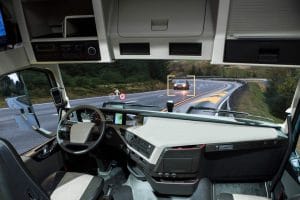Are Autonomous Trucks Safe?
 Commercial truck drivers have a difficult job. They drive long hours and live a lot of their life on the road as they work to get products and packages from one end of the country to the other. It is no surprise, then, that companies are making a push to create autonomous trucks.
Commercial truck drivers have a difficult job. They drive long hours and live a lot of their life on the road as they work to get products and packages from one end of the country to the other. It is no surprise, then, that companies are making a push to create autonomous trucks.
While certain autonomous vehicles have proven to be relatively safe in certain conditions – not a glowing recommendation, we know – commercial trucks pose different challenges. These autonomous trucks will have to interact with the human drivers around them, be able to predict human actions, and adapt to different types of weather and road conditions. If one of these vehicles crashes into another driver on the road, the human driver in the other vehicle could be seriously injured or killed. If the truck’s programming fails, who knows what damage it could cause.
What are the dangers of autonomous trucks?
While the idea of an autonomous truck is enticing, the reality is complicated. People have been killed in accidents with autonomous vehicles before; what would an accident with an autonomous truck look like?
There are an array of risks when it comes to autonomous vehicles. Autonomous trucks face the same sort of dangers that automated cars face, but the risks are greater as 18-wheelers are far larger and heavier than the average sized sedan. There are two unique dangers of autonomous trucks:
- Failed programming: This is one of the major risks of autonomous vehicles. Just as humans make mistakes, so do computers. Whether that is because of a loose wire, a program that was input incorrectly, or road conditions and weather that confuse the programming. Even such aspects such as the skin color of pedestrians have confused the computers in autonomous vehicles in the past. In addition, there are many events that can happen on the road that the truck may not know how to address, such as a tree falling into the road, or a dog crossing the street in front of it. If an emergency arises on the road, humans are well equipped to handle such emergencies, such as taking alternate routes, pulling over, or swerving. Driverless trucks can have anywhere between 30-100 computers on board, and if there is a malfunction with one of them, it may very well affect the rest of them, causing an accident.
- Hijacking: Autonomous trucks need to be able to send multiple signals, such as GPS, in order to track their location. Other necessary data that is sent and tracked include fuel levels, oil pressure, and speed. Certified Insurance Counselor, Patrick Wraight wrote that “if signals are being sent and received by the vehicle, it’s possible that those signals can be hacked or hijacked, allowing someone else to take control of the vehicle. At best that means that the vehicle is sent to a location other than where it should go, and the cargo stolen. At worst that means that the vehicle becomes a weapon in the hands of someone else.”
Any malfunction in these computers can lead to serious injuries and fatalities for the humans in the cars around the truck.
What injuries can I suffer from an accident with an autonomous truck?
If you are ever in an accident with a 18-wheeler, the injuries you face could be catastrophic as these trucks weigh several tons, and are much larger than any sedan. Depending on the circumstances, you could suffer from:
- Traumatic brain injury: Traumatic brain injuries (TBIs) occur when something hits your head, or you hit your head on something, causing damage to your head and brain. The sudden jolt can leave your brain with bruises and abrasions, leading to swelling and internal bleeding in your brain. A concussion is a mild form of TBI, and symptoms include dizziness, confusion, loss of consciousness, nausea, headaches, and loss of memory.
- Spinal cord injury: When your spinal cord is damaged, it can affect the rest of your body as your spinal cord is the main nexus for your nervous system. These injuries can lead to full or partial paralysis. If your injury is an incomplete spinal cord injury (SCI), then you may be left with some sensation and feeling below the point of the injury; this is partial paralysis. If the SCI is complete, you will lose all function and feeling under the site of the injury, leaving you fully paralyzed.
- Broken limbs: Broken limbs are a common type of injury, but can leave someone in pain and discomfort for weeks or months. Occasionally, the broken limb or area where the fractured bone is located will be stiff or sore for the rest of your life, depending on the treatment you received, and how quickly you received it after the accident.
- Burns: Burn accidents often leave victims not only physically scarred or disfigured, but mentally and emotionally. Burn injuries are some of the most painful injuries, and they require a long time to heal, with severe burns damaging muscles and nerves, and requiring costly skin grafts and medical treatments.
- Loss of limb: Traumatic amputations happen when the accident is so severe that the limb is severed on site, or later at the hospital when it is deemed too irreparably damaged to be saved. This sort of catastrophic and painful injury affects victims for the rest of their lives, having to deal with phantom pains, adapting to a life without an arm or leg, paying for expensive prosthetics, and the mental and emotional trauma of the memory of the accident.
- Death: The National Safety Council reported that in 2020, 4,842 large trucks were involved in fatal crashes. Losing a loved one is difficult, but losing them because an autonomous truck malfunctioned is tragic. You are left with the cost of the funeral and the loss of someone who was important to you. The emotional and financial burdens can be devastating.
Any of these injuries can negatively impact your life, such as losing the ability to work, loss of income, medical expenses, and emotional trauma.
Each day, technology advances, but it will always have its flaws. The question remains whether or not we want to trust driver-free or even driver-assisted autonomous vehicles on the road while other vehicles with people inside drive around them.
If you are ever involved in an accident with an automated commercial truck or vehicle, we can help you secure the compensation you deserve. At Merkel & Cocke, P.A. we will not back down from holding the manufacturers, distributors, and sellers liable for your injuries, pain and suffering, and any financial losses you suffer. Just because no one was behind the wheel (in the near future), does not mean that no one is responsible for your injuries. To discuss your legal rights, call our Mississippi truck accident lawyers at 662-627-9641 or fill out our contact form to schedule a free consultation. We represent clients in Clarksdale, Jackson, Oxford, and Greenville, and throughout the state, including Tupelo and the Delta Region.

Charles M. Merkel, III attended the University of Mississippi for his undergraduate and law degrees, graduating with honors from both. Upon graduation, he received the coveted position as a judicial law clerk for US District Court for the Southern District of Mississippi, Jackson Division. Mr. Merkel joined Merkel & Cocke, P.A. in 2002, where he works with clients who have sustained serious injuries because of negligence, medical malpractice and defective products. He has received many honors, included being cited by Super Lawyers, National Academy of Personal Injury Attorneys, and Best Lawyers in America. Learn more about Charles M. Merkel, III.
